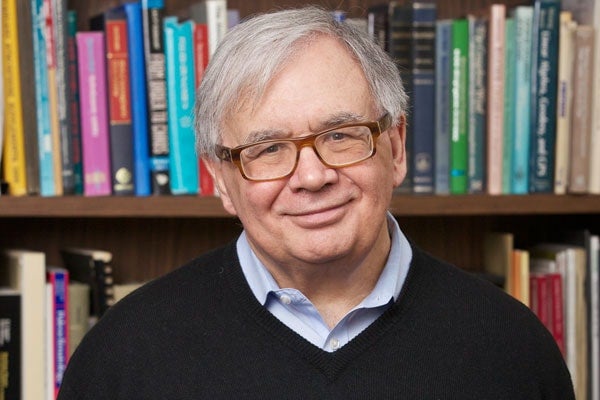
Pioneering physicist Richard Peltier wins Killam Prize
Published: April 3, 2013
University of Toronto physicist Dick Peltier is the winner of one of five 2013 Killam Prizes, given in honour of his career achievement in science.
The $100,000 prize from the Canada Council for the Arts recognizes his pioneering scholarship, which has shaped our understanding of Earth’s interconnected systems—and of the threat we face due to global warming.
Peltier has been a leader in the establishment of the interdisciplinary field of Earth System Science.
“The field grew out of efforts that began about 20 years ago,” he says, “when we began to understand that the Earth functions as a complex system of many interacting components and that the compartmentalization of the study of its behaviour was holding back progress.”
As such, his own work has spanned traditional disciplines: he’s investigated everything from planetary interiors to ocean currents to how the atmosphere behaves. One current focus is the global thermohaline circulation—the vertical overturning of the oceans, which is influenced by the behaviour of both the atmosphere above and the heat flux entering the ocean from the earth below.
“This is a perfect example of a phenomenon which is not strictly oceanographic, though it’s focused in the ocean. It’s a nice example of the sort of phenomenology that lies at the heart of Earth System Science, because it involves all of the components of the earth system working together.”
Much of Peltier’s research, including his study of the global thermohaline circulation, has sharpened our understanding of Earth’s climate history. Work by Peltier and his students has recently shed light on the Younger Dryas event, a 1,000 year period of Earth’s history that began about 12,800 years ago and had not previously been understood. Their work showed that it was caused when a massive deglacial flood of freshwater entered the Arctic Ocean through the Mackenzie River outlet into the Beaufort Sea.
“Professor Peltier’s research career has spanned a remarkable range of issues,” said Professor Paul Young, U of T’s vice-president (research and innovation). “It is this integrative approach that has allowed him to make such remarkable advances in our understanding of our planet, and I’m delighted that the Canada Council has recognized his contributions. We need scientists like him to arm us with the information required to tackle some of our most pressing global problems.”
Peltier’s exploration of Earth’s past has also allowed him to construct models that predict what is likely to happen in the future as a result of human-induced global warming. He sees his commitment to outreach and education as a natural extension of his science.
“It’s incumbent upon scientists like myself who are deeply involved in the discussion of climate change to do as much outreach as possible. It’s extremely important that people understand that global warming is a consequence of us. We continue to burn fossil fuels, and that process is adding carbon dioxide to the atmosphere. The fact that increasing carbon dioxide levels in the atmosphere cause warming on the surface of the earth is something that’s been understood for over 100 years.”
The Killam Prize is the latest in a collection of accolades Peltier has amassed in the past decade. He was the winner of the 2002 Vetlesen Prize (often called the Nobel of Earth Sciences), the 2010 Bower Prize and the 2011 Herzberg Gold Medal from the Natural Sciences and Engineering Council. The university has awarded him the University Professor designation, the highest honour the institution bestows on its faculty. At U of T, Peltier is director of the Centre for Global Change Science and scientific director of SciNet, Canada’s largest supercomputer centre.


